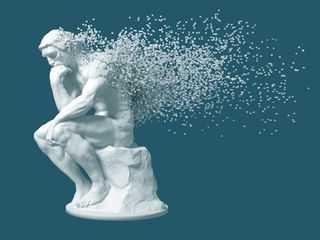What is quantum cognition? Physics theory could predict human behavior.
Curated from: livescience.com
Ideas, facts & insights covering these topics:
19 ideas
·2.62K reads
14
1
Explore the World's Best Ideas
Join today and uncover 100+ curated journeys from 50+ topics. Unlock access to our mobile app with extensive features.
Can Quantum Help Explain In "Human" Decision-making ?
Some scientists think quantum mechanics can help explain human decision-making.
The same fundamental platform that allows Schrödinger's cat to be both alive and dead, and also means two particles can "speak to each other" even across a galaxy's distance, could help to explain perhaps the most mysterious phenomena: human behavior
Both disciplines attempt to predict how unruly systems might behave in the future. The difference is that one field aims to understand the fundamental nature of physical particles, while the other attempts to explain human nature — along with its inherent fallacies.
42
375 reads
Quantum Probability Theory Can
"Cognitive scientists found that there are many 'irrational'human behaviors,"Xiaochu Zhang, a biophysicist and neuroscientist at the University of Science and Technology of China in Hefei, told that Classical theories of decision-making attempt to predict what choice a person will make given certain parameters,but fallible humans don't always behave as expected. Recent research suggests that these lapses in logic"can be well explained by quantum probability theory,"Zhang said.
The study is "the first to support the idea of quantum cognition at the neural level," Zhang said.
41
244 reads
Uncertainty
Quantum mechanics describes the behavior of the tiny particles that make up all matter in the universe, namely atoms and their subatomic components. One central tenet of the theory suggests a great deal of uncertainty in this world of the very small, something not seen at larger scales. For instance, in the big world, one can know where a train is on its route and how fast it's traveling, and given this data, one could predict when that train should arrive at the next station.
39
185 reads
and your predictive power disappears — you can't know the exact location and momentum of a given electron, but you could calculate the probability that the particle may appear in a certain spot, traveling at a particular rate. In this way, you could gain a hazy idea of what the electron might be up to.
Just as uncertainty pervades the subatomic world, it also seeps into our decision-making process, whether we're debating which new series to binge-watch or casting our vote in a presidential election.
38
159 reads
Unlike classical theories of decision-making, the quantum world makes room for a certain degree of uncertainty.
Classical psychology theories rest on the idea that people make decisions in order to maximize "rewards" and minimize "punishments" — in other words, to ensure their actions result in more positive outcomes than negative consequences.
39
164 reads
...
falls in line with Pavlonian conditioning, wherein people learn to predict the consequences of their actions based on past experiences, according to a 2009 report in the Journal of Mathematical Psychology .
If truly constrained by this framework, humans would consistently weigh the objective values of two options before choosing between them. But in reality, people don't always work that way; their subjective feelings about a situation undermine their ability to make objective decisions.
39
134 reads
Heads and tails (at the same time)
Consider an example:
Imagine you're placing bets on whether a tossed coin will land on heads or tails. Heads gets you $200, tails costs you $100, and you can choose to toss the coin twice. When placed in this scenario, most people choose to take the bet twice regardless of whether the initial throw results in a win or a loss, according to a study published in 1992 in the journal Cognitive Psychology . Presumably, winners bet a second time because they stand to gain money no matter what, while losers bet in attempt to recover their losses, and then some.
38
141 reads
Paradox:
However, if players aren't allowed to know the result of the first coin flip, they rarely make the second gamble.
When known, the first flip does not sway the choice that follows, but when unknown, it makes all the difference. This paradox does not fit within the framework of classical reinforcement learning, which predicts that the objective choice should always be the same. In contrast, quantum mechanics takes uncertainty into account and actually predicts this odd outcome.
38
137 reads
....
"One could say that the 'quantum-based' model of decision-making refers essentially to the use of quantum probability in the area of cognition," Emmanuel Haven and Andrei Khrennikov, co-authors of the textbook "Quantum Social Science" (Cambridge University Press, 2013),said.
Just as a particular electron might be here or there at a given moment, quantum mechanics assumes that the first coin toss resulted in both a win and a loss, simultaneously. (In other words, in the famous thought experiment, Schrödinger's cat is both alive and dead.)
39
121 reads
....
an individual's final choice is unknown and unpredictable. Quantum mechanics also acknowledges that people's beliefs about the outcome of a given decision — whether it will be good or bad — often reflect what their final choice ends up being. In this way, people's beliefs interact, or become "entangled ," with their eventual action.
Subatomic particles can likewise become entangled and influence each other's behavior even when separated by great distances.
40
114 reads
Analogy Betw÷en Beliefs And Behaviours
the behavior of a particle located in Japan would alter the behavior of its entangled partner in the United States. In psychology, a similar analogy can be drawn between beliefs and behaviors. "It is precisely this interaction," or state of entanglement, "which influences the measurement outcome," Haven and Khrennikov said. The measurement outcome, in this case, refers to the final choice an individual makes. "This can be precisely formulated with the aid of quantum probability."
39
113 reads
Scientists can mathematically model this entangled state of superposition — in which two particles affect each other even if they’re separated by a large distance — as demonstrated in a 2007 report published by the Association for the Advancement of Artificial Intelligence . And remarkably, the final formula accurately predicts the paradoxical outcome of the coin toss paradigm. "The lapse in logic can be better explained by using the quantum-based approach," Haven and Khrennikov noted.
38
95 reads
Betting on quantum
In their new study, Zhang and his colleagues pitted 2 quantum-based models of decision-making against 12classical psychology models to see which best predicted human behavior during a psychological task.The experiment, known as the Iowa Gambling Task ,is designed to evaluate people's ability to learn from mistakes and adjust their decisionmaking strategy over time.
In the task,participants draw from four decks of cards. Each card either earns the player money or costs them money,and the object of the game is to earn as much money as possible.The catch lies in how each deck of cards is stacked.
39
100 reads
...
Drawing from one deck may earn a player large sums of money in the short term, but it will cost them far more cash by the end of the game. Other decks deliver smaller sums of money in the short-term, but fewer penalties overall. Through game play, winners learn to mostly draw from the "slow and steady" decks, while losers draw from the decks that earn them quick cash and steep penalties.
Historically, those with drug addictions or brain damage perform worse on the Iowa Gambling Task than healthy participants, which suggests that their condition somehow impairs decision-making abilities,
38
91 reads
....
as highlighted in a study published in 2014 in the journal Applied Neuropsychology: Child . This pattern held true in Zhang's experiment, which included about 60 healthy participants and 40 who were addicted to nicotine.
The two quantum models made similar predictions to the most accurate among the classical models, the authors noted. "Although the [quantum] models did not overwhelmingly outperform the [classical] ... one should be aware that the [quantum reinforcement learning] framework is still in its infancy and undoubtedly deserves additional studies," they added.
39
90 reads
.....
To bolster the value of their study, the team took brain scans of each participant as they completed the Iowa Gambling Task. In doing so, the authors attempted to peek at what was happening inside the brain as participants learned and adjusted their game-play strategy over time. Outputs generated by the quantum model predicted how this learning process would unfold, and thus, the authors theorized that hotspots of brain activity might somehow correlate with the models' predictions.
38
88 reads
a number of active brain areas in the healthy participants during game play, including activation of several large folds within the frontal lobe known to be involved in decision-making. In the smoking group, however, no hotspots of brain activity seemed tied to predictions made by the quantum model. As the model reflects participants' ability to learn from mistakes, the results may illustrate decision-making impairments in the smoking group, the authors noted.
38
91 reads
First Step Towards Solution
However, "further research is warranted" to determine what these brain activity differences truly reflect in smokers and non-smokers, they added. "The coupling of the quantum-like models with neurophysiological processes in the brain ... is a very complex problem," Haven and Khrennikov said. "This study is of great importance as the first step towards its solution."
Models of classical reinforcement learning have shown "great success" in studies of emotion, psychiatric disorders, social behavior, free will and many other cognitive functions, Zhang said.
38
85 reads
Let's Convert Hope To Trust
"We hope that quantum reinforcement learning will also shed light on [these fields], providing unique insights."
In time, perhaps quantum mechanics will help explain pervasive flaws in human logic, as well as how that fallibility manifests at the level of individual neurons.
38
102 reads
IDEAS CURATED BY
卐 || एकं सत विप्रा बहुधा वदन्ति || Enthusiast || Collection Of Some Best Reads || Decentralizing...
अर्हम् Arham's ideas are part of this journey:
Learn more about scienceandnature with this collection
How to choose the right music for different tasks
The benefits of listening to music while working
How music affects productivity
Related collections
Similar ideas
2 ideas
What is a quantum computer?
newscientist.com
6 ideas
Quantum physics
newscientist.com
Read & Learn
20x Faster
without
deepstash
with
deepstash
with
deepstash
Personalized microlearning
—
100+ Learning Journeys
—
Access to 200,000+ ideas
—
Access to the mobile app
—
Unlimited idea saving
—
—
Unlimited history
—
—
Unlimited listening to ideas
—
—
Downloading & offline access
—
—
Supercharge your mind with one idea per day
Enter your email and spend 1 minute every day to learn something new.
I agree to receive email updates

